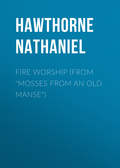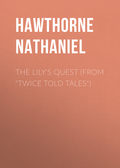
Натаниель Готорн
Twice Told Tales
SIGHTS FROM A STEEPLE
So! I have climbed high, and my reward is small. Here I stand with wearied knees – earth, indeed, at a dizzy depth below, but heaven far, far beyond me still. Oh that I could soar up into the very zenith, where man never breathed nor eagle ever flew, and where the ethereal azure melts away from the eye and appears only a deepened shade of nothingness! And yet I shiver at that cold and solitary thought. What clouds are gathering in the golden west with direful intent against the brightness and the warmth of this summer afternoon? They are ponderous air-ships, black as death and freighted with the tempest, and at intervals their thunder – the signal-guns of that unearthly squadron – rolls distant along the deep of heaven. These nearer heaps of fleecy vapor – methinks I could roll and toss upon them the whole day long – seem scattered here and there for the repose of tired pilgrims through the sky. Perhaps – for who can tell? – beautiful spirits are disporting themselves there, and will bless my mortal eye with the brief appearance of their curly locks of golden light and laughing faces fair and faint as the people of a rosy dream. Or where the floating mass so imperfectly obstructs the color of the firmament a slender foot and fairy limb resting too heavily upon the frail support may be thrust through and suddenly withdrawn, while longing fancy follows them in vain. Yonder, again, is an airy archipelago where the sunbeams love to linger in their journeyings through space. Every one of those little clouds has been dipped and steeped in radiance which the slightest pressure might disengage in silvery profusion like water wrung from a sea-maid's hair. Bright they are as a young man's visions, and, like them, would be realized in dullness, obscurity and tears. I will look on them no more.
In three parts of the visible circle whose centre is this spire I discern cultivated fields, villages, white country-seats, the waving lines of rivulets, little placid lakes, and here and there a rising ground that would fain be termed a hill. On the fourth side is the sea, stretching away toward a viewless boundary, blue and calm except where the passing anger of a shadow flits across its surface and is gone. Hitherward a broad inlet penetrates far into the land; on the verge of the harbor formed by its extremity is a town, and over it am I, a watchman, all-heeding and unheeded. Oh that the multitude of chimneys could speak, like those of Madrid, and betray in smoky whispers the secrets of all who since their first foundation have assembled at the hearths within! Oh that the Limping Devil of Le Sage would perch beside me here, extend his wand over this contiguity of roofs, uncover every chamber and make me familiar with their inhabitants! The most desirable mode of existence might be that of a spiritualized Paul Pry hovering invisible round man and woman, witnessing their deeds, searching into their hearts, borrowing brightness from their felicity and shade from their sorrow, and retaining no emotion peculiar to himself. But none of these things are possible; and if I would know the interior of brick walls or the mystery of human bosoms, I can but guess.
Yonder is a fair street extending north and south. The stately mansions are placed each on its carpet of verdant grass, and a long flight of steps descends from every door to the pavement. Ornamental trees – the broadleafed horse-chestnut, the elm so lofty and bending, the graceful but infrequent willow, and others whereof I know not the names – grow thrivingly among brick and stone. The oblique rays of the sun are intercepted by these green citizens and by the houses, so that one side of the street is a shaded and pleasant walk. On its whole extent there is now but a single passenger, advancing from the upper end, and he, unless distance and the medium of a pocket spyglass do him more than justice, is a fine young man of twenty. He saunters slowly forward, slapping his left hand with his folded gloves, bending his eyes upon the pavement, and sometimes raising them to throw a glance before him. Certainly he has a pensive air. Is he in doubt or in debt? Is he – if the question be allowable – in love? Does he strive to be melancholy and gentlemanlike, or is he merely overcome by the heat? But I bid him farewell for the present. The door of one of the houses – an aristocratic edifice with curtains of purple and gold waving from the windows – is now opened, and down the steps come two ladies swinging their parasols and lightly arrayed for a summer ramble. Both are young, both are pretty; but methinks the left-hand lass is the fairer of the twain, and, though she be so serious at this moment, I could swear that there is a treasure of gentle fun within her. They stand talking a little while upon the steps, and finally proceed up the street. Meantime, as their faces are now turned from me, I may look elsewhere.
Upon that wharf and down the corresponding street is a busy contrast to the quiet scene which I have just noticed. Business evidently has its centre there, and many a man is wasting the summer afternoon in labor and anxiety, in losing riches or in gaining them, when he would be wiser to flee away to some pleasant country village or shaded lake in the forest or wild and cool sea-beach. I see vessels unlading at the wharf and precious merchandise strown upon the ground abundantly as at the bottom of the sea – that market whence no goods return, and where there is no captain nor supercargo to render an account of sales. Here the clerks are diligent with their paper and pencils and sailors ply the block and tackle that hang over the hold, accompanying their toil with cries long-drawn and roughly melodious till the bales and puncheons ascend to upper air. At a little distance a group of gentlemen are assembled round the door of a warehouse. Grave seniors be they, and I would wager – if it were safe, in these times, to be responsible for any one – that the least eminent among them might vie with old Vincentio, that incomparable trafficker of Pisa. I can even select the wealthiest of the company. It is the elderly personage in somewhat rusty black, with powdered hair the superfluous whiteness of which is visible upon the cape of his coat. His twenty ships are wafted on some of their many courses by every breeze that blows, and his name, I will venture to say, though I know it not, is a familiar sound among the far-separated merchants of Europe and the Indies.
But I bestow too much of my attention in this quarter. On looking again to the long and shady walk I perceive that the two fair girls have encountered the young man. After a sort of shyness in the recognition, he turns back with them. Moreover, he has sanctioned my taste in regard to his companions by placing himself on the inner side of the pavement, nearest the Venus to whom I, enacting on a steeple-top the part of Paris on the top of Ida, adjudged the golden apple.
In two streets converging at right angles toward my watch-tower I distinguish three different processions. One is a proud array of voluntary soldiers in bright uniform, resembling, from the height whence I look down, the painted veterans that garrison the windows of a toy-shop. And yet it stirs my heart. Their regular advance, their nodding plumes, the sun-flash on their bayonets and musket-barrels, the roll of their drums ascending past me, and the fife ever and anon piercing through, – these things have wakened a warlike fire, peaceful though I be. Close to their rear marches a battalion of schoolboys ranged in crooked and irregular platoons, shouldering sticks, thumping a harsh and unripe clatter from an instrument of tin and ridiculously aping the intricate manoeuvres of the foremost band. Nevertheless, as slight differences are scarcely perceptible from a church-spire, one might be tempted to ask, "Which are the boys?" or, rather, "Which the men?" But, leaving these, let us turn to the third procession, which, though sadder in outward show, may excite identical reflections in the thoughtful mind. It is a funeral – a hearse drawn by a black and bony steed and covered by a dusty pall, two or three coaches rumbling over the stones, their drivers half asleep, a dozen couple of careless mourners in their every-day attire. Such was not the fashion of our fathers when they carried a friend to his grave. There is now no doleful clang of the bell to proclaim sorrow to the town. Was the King of Terrors more awful in those days than in our own, that wisdom and philosophy have been able to produce this change? Not so. Here is a proof that he retains his proper majesty. The military men and the military boys are wheeling round the corner, and meet the funeral full in the face. Immediately the drum is silent, all but the tap that regulates each simultaneous footfall. The soldiers yield the path to the dusty hearse and unpretending train, and the children quit their ranks and cluster on the sidewalks with timorous and instinctive curiosity. The mourners enter the churchyard at the base of the steeple and pause by an open grave among the burial-stones; the lightning glimmers on them as they lower down the coffin, and the thunder rattles heavily while they throw the earth upon its lid. Verily, the shower is near, and I tremble for the young man and the girls, who have now disappeared from the long and shady street.
How various are the situations of the people covered by the roofs beneath me, and how diversified are the events at this moment befalling them! The new-born, the aged, the dying, the strong in life and the recent dead are in the chambers of these many mansions. The full of hope, the happy, the miserable and the desperate dwell together within the circle of my glance. In some of the houses over which my eyes roam so coldly guilt is entering into hearts that are still tenanted by a debased and trodden virtue; guilt is on the very edge of commission, and the impending deed might be averted; guilt is done, and the criminal wonders if it be irrevocable. There are broad thoughts struggling in my mind, and, were I able to give them distinctness, they would make their way in eloquence. Lo! the raindrops are descending.
The clouds within a little time have gathered over all the sky, hanging heavily, as if about to drop in one unbroken mass upon the earth. At intervals the lightning flashes from their brooding hearts, quivers, disappears, and then comes the thunder, travelling slowly after its twin-born flame. A strong wind has sprung up, howls through the darkened streets, and raises the dust in dense bodies to rebel against the approaching storm. The disbanded soldiers fly, the funeral has already vanished like its dead, and all people hurry homeward – all that have a home – while a few lounge by the corners or trudge on desperately at their leisure. In a narrow lane which communicates with the shady street I discern the rich old merchant putting himself to the top of his speed lest the rain should convert his hair-powder to a paste. Unhappy gentleman! By the slow vehemence and painful moderation wherewith he journeys, it is but too evident that Podagra has left its thrilling tenderness in his great toe. But yonder, at a far more rapid pace, come three other of my acquaintance, the two pretty girls and the young man unseasonably interrupted in their walk. Their footsteps are supported by the risen dust, the wind lends them its velocity, they fly like three sea-birds driven landward by the tempestuous breeze. The ladies would not thus rival Atalanta if they but knew that any one were at leisure to observe them. Ah! as they hasten onward, laughing in the angry face of nature, a sudden catastrophe has chanced. At the corner where the narrow lane enters into the street they come plump against the old merchant, whose tortoise-motion has just brought him to that point. He likes not the sweet encounter; the darkness of the whole air gathers speedily upon his visage, and there is a pause on both sides. Finally he thrusts aside the youth with little courtesy, seizes an arm of each of the two girls, and plods onward like a magician with a prize of captive fairies. All this is easy to be understood. How disconsolate the poor lover stands, regardless of the rain that threatens an exceeding damage to his well-fashioned habiliments, till he catches a backward glance of mirth from a bright eye, and turns away with whatever comfort it conveys!
The old man and his daughters are safely housed, and now the storm lets loose its fury. In every dwelling I perceive the faces of the chambermaids as they shut down the windows, excluding the impetuous shower and shrinking away from the quick fiery glare. The large drops descend with force upon the slated roofs and rise again in smoke. There is a rush and roar as of a river through the air, and muddy streams bubble majestically along the pavement, whirl their dusky foam into the kennel, and disappear beneath iron grates. Thus did Arethusa sink. I love not my station here aloft in the midst of the tumult which I am powerless to direct or quell, with the blue lightning wrinkling on my brow and the thunder muttering its first awful syllables in my ear. I will descend. Yet let me give another glance to the sea, where the foam breaks out in long white lines upon a broad expanse of blackness or boils up in far-distant points like snowy mountain-tops in the eddies of a flood; and let me look once more at the green plain and little hills of the country, over which the giant of the storm is striding in robes of mist, and at the town whose obscured and desolate streets might beseem a city of the dead; and, turning a single moment to the sky, now gloomy as an author's prospects, I prepare to resume my station on lower earth. But stay! A little speck of azure has widened in the western heavens; the sunbeams find a passage and go rejoicing through the tempest, and on yonder darkest cloud, born like hallowed hopes of the glory of another world and the trouble and tears of this, brightens forth the rainbow.
THE HOLLOW OF THE THREE HILLS
In those strange old times when fantastic dreams and madmen's reveries were realized among the actual circumstances of life, two persons met together at an appointed hour and place. One was a lady graceful in form and fair of feature, though pale and troubled and smitten with an untimely blight in what should have been the fullest bloom of her years; the other was an ancient and meanly-dressed woman of ill-favored aspect, and so withered, shrunken and decrepit that even the space since she began to decay must have exceeded the ordinary term of human existence. In the spot where they encountered no mortal could observe them. Three little hills stood near each other, and down in the midst of them sunk a hollow basin almost mathematically circular, two or three hundred feet in breadth and of such depth that a stately cedar might but just be visible above the sides. Dwarf pines were numerous upon the hills and partly fringed the outer verge of the intermediate hollow, within which there was nothing but the brown grass of October and here and there a tree-trunk that had fallen long ago and lay mouldering with no green successor from its roots. One of these masses of decaying wood, formerly a majestic oak, rested close beside a pool of green and sluggish water at the bottom of the basin. Such scenes as this (so gray tradition tells) were once the resort of a power of evil and his plighted subjects, and here at midnight or on the dim verge of evening they were said to stand round the mantling pool disturbing its putrid waters in the performance of an impious baptismal rite. The chill beauty of an autumnal sunset was now gilding the three hill-tops, whence a paler tint stole down their sides into the hollow.
"Here is our pleasant meeting come to pass," said the aged crone, "according as thou hast desired. Say quickly what thou wouldst have of me, for there is but a short hour that we may tarry here."
As the old withered woman spoke a smile glimmered on her countenance like lamplight on the wall of a sepulchre. The lady trembled and cast her eyes upward to the verge of the basin, as if meditating to return with her purpose unaccomplished. But it was not so ordained.
"I am stranger in this land, as you know," said she, at length. "Whence I come it matters not, but I have left those behind me with whom my fate was intimately bound, and from whom I am cut off for ever. There is a weight in my bosom that I cannot away with, and I have come hither to inquire of their welfare."
"And who is there by this green pool that can bring thee news from the ends of the earth?" cried the old woman, peering into the lady's face. "Not from my lips mayst thou hear these tidings; yet be thou bold, and the daylight shall not pass away from yonder hilltop before thy wish be granted."
"I will do your bidding though I die," replied the lady, desperately.
The old woman seated herself on the trunk of the fallen tree, threw aside the hood that shrouded her gray locks and beckoned her companion to draw near.
"Kneel down," she said, "and lay your forehead on my knees."
She hesitated a moment, but the anxiety that had long been kindling burned fiercely up within her. As she knelt down the border of her garment was dipped into the pool; she laid her forehead on the old woman's knees, and the latter drew a cloak about the lady's face, so that she was in darkness. Then she heard the muttered words of prayer, in the midst of which she started and would have arisen.
"Let me flee! Let me flee and hide myself, that they may not look upon me!" she cried. But, with returning recollection, she hushed herself and was still as death, for it seemed as if other voices, familiar in infancy and unforgotten through many wanderings and in all the vicissitudes of her heart and fortune, were mingling with the accents of the prayer. At first the words were faint and indistinct – not rendered so by distance, but rather resembling the dim pages of a book which we strive to read by an imperfect and gradually brightening light. In such a manner, as the prayer proceeded, did those voices strengthen upon the ear, till at length the petition ended, and the conversation of an aged man and of a woman broken and decayed like himself became distinctly audible to the lady as she knelt. But those strangers appeared not to stand in the hollow depth between the three hills. Their voices were encompassed and re-echoed by the walls of a chamber the windows of which were rattling in the breeze; the regular vibration of a clock, the crackling of a fire and the tinkling of the embers as they fell among the ashes rendered the scene almost as vivid as if painted to the eye. By a melancholy hearth sat these two old people, the man calmly despondent, the woman querulous and tearful, and their words were all of sorrow. They spoke of a daughter, a wanderer they knew not where, bearing dishonor along with her and leaving shame and affliction to bring their gray heads to the grave. They alluded also to other and more recent woe, but in the midst of their talk their voices seemed to melt into the sound of the wind sweeping mournfully among the autumn leaves; and when the lady lifted her eyes, there was she kneeling in the hollow between three hills.
"A weary and lonesome time yonder old couple have of it," remarked the old woman, smiling in the lady's face.
"And did you also hear them?" exclaimed she, a sense of intolerable humiliation triumphing over her agony and fear.
"Yea, and we have yet more to hear," replied the old woman, "wherefore cover thy face quickly."
Again the withered hag poured forth the monotonous words of a prayer that was not meant to be acceptable in heaven, and soon in the pauses of her breath strange murmurings began to thicken, gradually increasing, so as to drown and overpower the charm by which they grew. Shrieks pierced through the obscurity of sound and were succeeded by the singing of sweet female voices, which in their turn gave way to a wild roar of laughter broken suddenly by groanings and sobs, forming altogether a ghastly confusion of terror and mourning and mirth. Chains were rattling, fierce and stern voices uttered threats and the scourge resounded at their command. All these noises deepened and became substantial to the listener's ear, till she could distinguish every soft and dreamy accent of the love-songs that died causelessly into funeral-hymns. She shuddered at the unprovoked wrath which blazed up like the spontaneous kindling of flume, and she grew faint at the fearful merriment raging miserably around her. In the midst of this wild scene, where unbound passions jostled each other in a drunken career, there was one solemn voice of a man, and a manly and melodious voice it might once have been. He went to and fro continually, and his feet sounded upon the floor. In each member of that frenzied company whose own burning thoughts had become their exclusive world he sought an auditor for the story of his individual wrong, and interpreted their laughter and tears as his reward of scorn or pity. He spoke of woman's perfidy, of a wife who had broken her holiest vows, of a home and heart made desolate. Even as he went on, the shout, the laugh, the shriek, the sob, rose up in unison, till they changed into the hollow, fitful and uneven sound of the wind as it fought among the pine trees on those three lonely hills.
The lady looked up, and there was the withered woman smiling in her face.
"Couldst thou have thought there were such merry times in a mad-house?" inquired the latter.
"True, true!" said the lady to herself; "there is mirth within its walls, but misery, misery without."
"Wouldst thou hear more?" demanded the old woman.
"There is one other voice I would fain listen to again," replied the lady, faintly.
"Then lay down thy head speedily upon my knees, that thou mayst get thee hence before the hour be past."
The golden skirts of day were yet lingering upon the hills, but deep shades obscured the hollow and the pool, as if sombre night were rising thence to overspread the world. Again that evil woman began to weave her spell. Long did it proceed unanswered, till the knolling of a bell stole in among the intervals of her words like a clang that had travelled far over valley and rising ground and was just ready to die in the air. The lady shook upon her companion's knees as she heard that boding sound. Stronger it grew, and sadder, and deepened into the tone of a death-bell, knolling dolefully from some ivy-mantled tower and bearing tidings of mortality and woe to the cottage, to the hall and to the solitary wayfarer, that all might weep for the doom appointed in turn to them. Then came a measured tread, passing slowly, slowly on, as of mourners with a coffin, their garments trailing on the ground, so that the ear could measure the length of their melancholy array. Before them went the priest, reading the burial-service, while the leaves of his book were rustling in the breeze. And though no voice but his was heard to speak aloud, still there were revilings and anathemas, whispered but distinct, from women and from men, breathed against the daughter who had wrung the aged hearts of her parents, the wife who had betrayed the trusting fondness of her husband, the mother who had sinned against natural affection and left her child to die. The sweeping sound of the funeral train faded away like a thin vapor, and the wind, that just before had seemed to shake the coffin-pall, moaned sadly round the verge of the hollow between three hills. But when the old woman stirred the kneeling lady, she lifted not her head.
"Here has been a sweet hour's sport!" said the withered crone, chuckling to herself.







